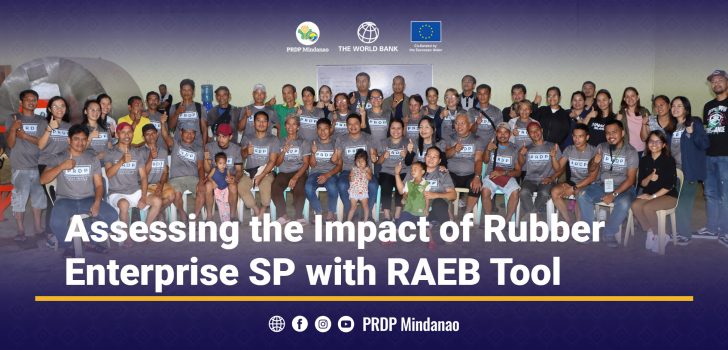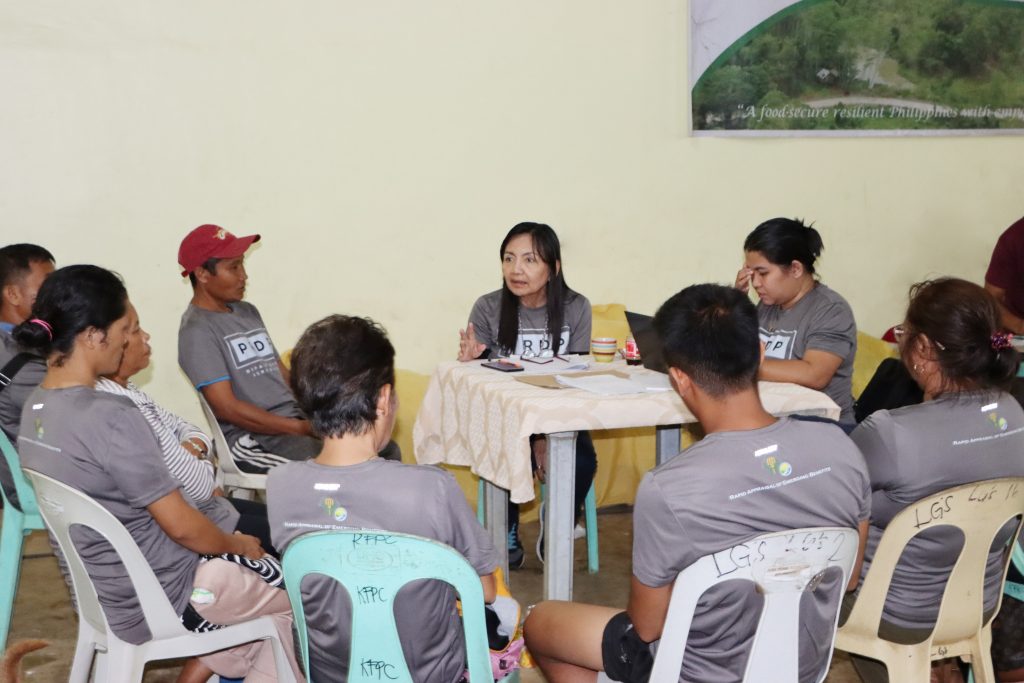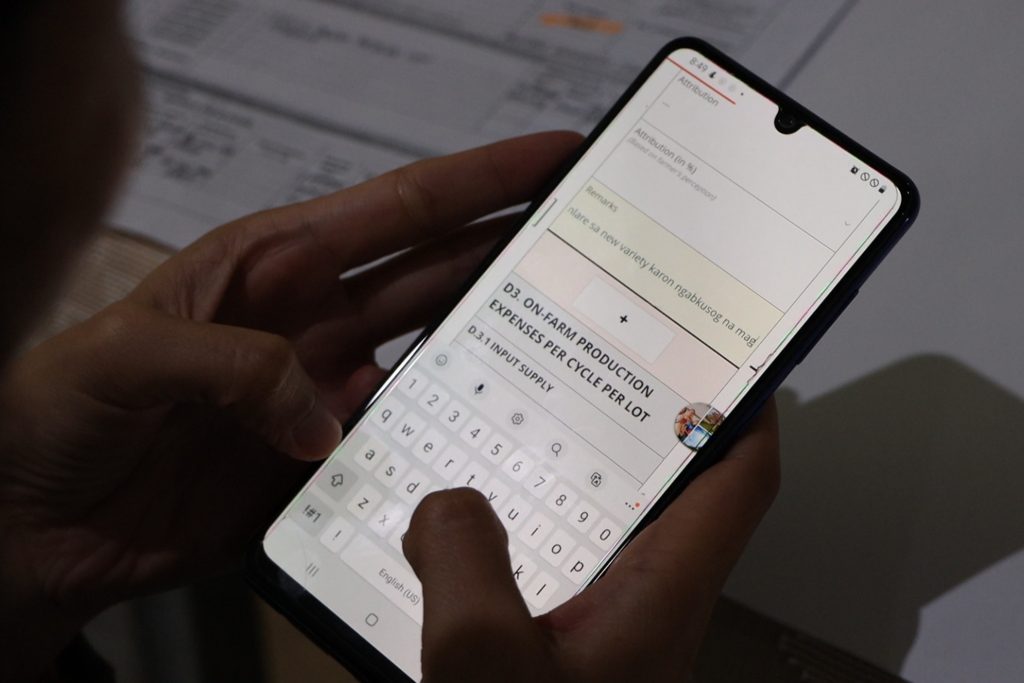
Assessing the Impact of Rubber Enterprise SP with RAEB Tool
In pursuit of capturing the socioeconomic benefits gained from a completed rubber subproject, DA-PRDP Caraga’s Monitoring and Evaluation (M&E) unit spearheaded a Rapid Appraisal of the Emerging Benefits (RAEB) gained by the KM7 Farmers Producer Cooperative (KFPC) in Barangay Tungao, Butuan City.
RAEB is a PRDP evaluation tool used to monitor completed infrastructure and enterprise subprojects under PRDP’s I-BUILD and I-REAP components.
‘In the conduct of the RAEB, we are focused on determining the success of individual subprojects and how these achievements align with or are relevant to the project development objectives of DA-PRDP’, says M&E Unit Head Menchie A. Samorano.
To gauge the subproject’s impact on its beneficiaries, PRDP Caraga’s RAEB team, with assistance from the Project Support Office (PSO) Mindanao, conducted household surveys, focus group discussions with farmer-beneficiaries and LGU partners, farm profiling and geotagging, and on-the-spot interviews from January 29 – February 2, 2024.
Boosting the rubber industry of Butuan
Completed in June 2020, the Integrated Rubber Production and Marketing subproject was implemented to address constraints in the production, input supply, and processing of rubber crumbs in Butuan City. The subproject, which totals P22,184,350.13, includes the turnover of a newly constructed warehouse for rubber cup lump consolidation, a seedling production facility building, a hauling truck, and various planting materials.
‘The subproject was created to respond to the different problems of rubber farmers in Butuan City, especially low productivity, lack of organization, and insufficient access to infrastructure. This is in line with the primary goal of the I-REAP component: to strengthen agri-fisheries enterprises by raising their incomes and generating more jobs,’ says Ameroche Caba, PSO Mindanao Organizational Development Specialist.
Jesus Ojario, a member of KFPC’s board of directors, illustrates the contrast in production before and after DA-PRDP’s interventions: ‘Before, our old clones were not as productive and only yielded about ¼ of a kilo every 15 days. Today, with the new clones provided by DA-PRDP, we can produce 1 kilo per tree for every 15 days.’
Apart from increased production, the cooperative has also seen a transformation in the quality of its rubber. ‘We used to gather our yield using only coconut shells. The problem was, we would place these directly on the ground and dirt would get mixed into our latex. Buyers would reduce the price from P25 to P20 per kilo because of the contamination,’ shares Jerico Ayuban, a rubber farmer and member of KFPC.
‘DA-PRDP has trained us on Good Agricultural Practices in rubber production, and we’ve taught our members good practices in tapping management. Because of these interventions, the cooperative can now produce 15 tons every 15 days,’ adds Samuel Calawigan Jr., KFPC Chairman.
Interestingly, the cooperative attributes its success to the strategic intersection of DA-PRDP interventions. While livelihoods have been improved with the completed enterprise subproject, it was the DA-PRDP farm-to-market road that facilitated the expansion of their markets.
The Lauan – Tud-ol FMR is a 9.82-kilometer farm-to-market road that traverses the barangays of Tungao and San Mateo. Completed in 2022, it aims to complement the enterprise subproject in connecting the enterprise to wider markets.
‘In making our deliveries to Butuan before, vegetables that would weigh 20 kilos would be reduced to 8 kilos. Buyers refused to purchase damaged crops. Hauling our products used to take us three days to finish. Today we can finish it within a day,’ shares Jerico.
Thriving through the holistic support of DA-PRDP, today, the cooperative has begun venturing into diversified farming.
‘We have expanded to different commodities through diversified farming. We intercrop our rubber plantations with various crops – some cultivate pineapples, bananas, a variety of vegetables, coffee, and more,’ says Samuel.
Mainstreaming the RAEB tool
The rapid appraisal of the rubber enterprise marks the first RAEB conducted by the Regional Project Coordination Office (RPCO) Caraga in 2024. In line with DA’s directive to institutionalize the tools and processes of the Philippine Rural Development Project (PRDP), it also capacitated and actively involved technical staff from DA’s regular programs and special projects.
Deputy Project Director Jodel A. Tabada cites the RAEB as one of PRDP’s best practices, expressing her hope that it will be institutionalized into DA’s regular programs as this will aid in the evaluation of its completed projects.
‘PRDP has invested considerably into the crafting of the RAEB tool. It is a ready tool that can be adopted by DA’s regular programs to improve post-project assessment and even improve its pre-implementation,’ adds M&E unit head Menchie Samorano.
Technical staff from the DA-13 Planning and Monitoring Evaluation Division (PMED), Field Operations Division (FOD), Agribusiness and Marketing Assistance Division (AMAD), and the newly launched Mindanao Inclusive Agriculture Development Project (MIADP) actively participated in the conduct of the RAEB. (Nichole L. Talatala, Media Production Officer ,PRDP 13)


